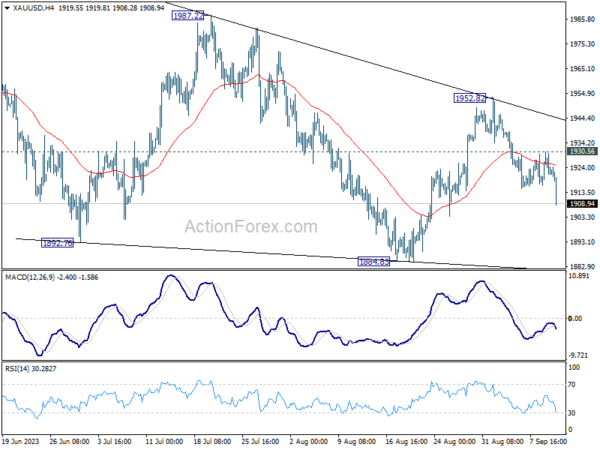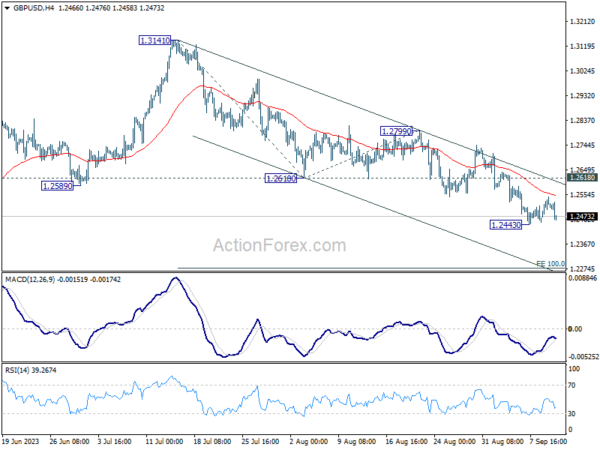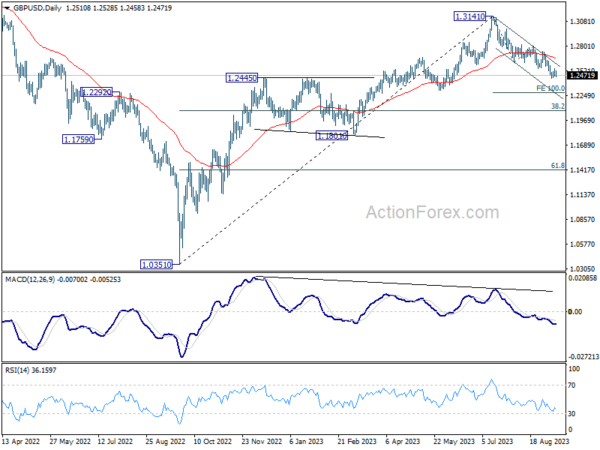Euro and Sterling stumbled today as they responded to less than impressive economic indicators. Despite a slight uplift in German economic sentiment, the broader picture reflected deteriorating current situation, adding pressure on the common currency. Concurrently, the Pound exhibited a steeper reaction to the shrinking payroll employment coupled with the decelerated wage growth noted in August, accentuating the weak undercurrents plaguing the currency. Swiss Franc seemed to benefit, albeit modestly, from purchases made against its two European peers.
Shifting focus to Dollar, it is overturning the setback it encountered earlier this week, even though it is kept within familiar range against other majors currencies for now. Riding closely on the heels of Dollar, Canadian emerged as the day’s second best performer.
On the technical side, Gold’s decline from 1952.82 resumed by breaking through 1915.10 support today, on the back of Dollar’s rebound. For now, further fall is expected as long as 1930.56 resistance holds. The fall from 1952.82 should target 1900 psychological, and likely further to 1884.83 support. Subsequent reactions around this level will be crucial in assessing whether Gold is on a prolonged decline from its 2062.95 peak.
In Europe, at the time of writing, FTSE is up 0.39%. DAX is down -0.50%. CAC is down -0.27%. Germany 10-year yield is down -0.012 at 2.629. Earlier in Asia, Nikkei rose 0.95%. Hong Kong HSI dropped -0.39%. China Shanghai SSE dropped -0.18%. Singapore Strait Times dropped -0.12%. Japan 10-year JGB yield rose 0.0048 to 0.710.
German ZEW improves to -11.4, but situation tumbles to -79.4
Germany’s ZEW Economic Sentiment for September experienced an uptick, rising from -12.3 to -11.4, surpassing the anticipated drop to -15.0. However, not all was rosy for the nation, as Current Situation index witnessed a downturn, descending from -71.3 to -79.4, which was a more significant dip than forecasted 75.0.
On a broader scale, Eurozone’s ZEW Economic Sentiment slid from -5.5 to -8.9, trailing the predicted -6.2. Current Situation for the zone also decreased marginally, moving by -0.6 to rest at -42.6.
Shedding light on these figures, ZEW President Professor Achim Wambach remarked, “The assessment of the current economic situation in Germany by the financial market experts is even more pessimistic than in August 2023.” While this paints a subdued picture of the present scenario, Wambach highlighted a silver lining, pointing to the “slight improvement in expectations regarding Germany’s economic situation over the next six months.”
Drawing connections to the international arena, Wambach added, “The brighter economic prospects for Germany align with a notably more optimistic view of international stock market developments.” He attributed this, in part, to the growing segment of respondents who foresee stability in interest rates within both Eurozone and US. Furthermore, experts are looking eastwards, projecting a relaxation in China’s interest rate policy.
Incoming BoE Breeden sees relatively flat UK GDP growth next few years
Sarah Breeden, the incoming Deputy Governor for BoE, shared her economic forecast during a parliamentary Treasury Committee approval hearing today. She is slated to replace Jon Cunliffe as come November.
Breeden conveyed her anticipation for the inflation rate to be near the 2% target within a span of two years, an outlook that is based on the premises outlined in BoE’s August forecast.
Despite the somewhat optimistic perspective on inflation, Breeden aired her expectation of “relatively flat GDP in the UK over the next couple of year”.
The expectation for a subdued GDP is rooted in the “impact of past increases in Bank Rate increasingly push down on demand, and supply remains very weak.”
Breeden concurred with the MPC’s perspective that inflation risks pertaining to the August forecasts are “skewed to the upside”. She acknowledged that “second-round effects via price and wage setting are stronger than had previously been expected.” When it comes to growth and unemployment, Breeden sees a pathway filled with “balanced risks”, which could swing in either direction.
UK payrolled employment down -1k in Aug, median monthly pay growth slowed
In August, UK saw a minimal decline in payrolled employment by -1,000 (-0.0% mom) bringing the total to 30.1 million. In a positive revision, prior month’s figures were adjusted from a -4k decrease to a substantial increase of 97k. Despite this, there is no dismissing the slowed momentum in the job market as reflected in the slight decline in August.
Dive deeper into the earnings, and one notices a yoy rise of 6.7% for the median monthly pay, touching GBP 2,260. The service activities sector led this growth, clocking an 8.7% yoy rise, while the finance and insurance sector recorded the lowest at 3.2% yoy. However, there was a perceptible deceleration in the growth rate of median monthly pay, down from July’s 7.6% yoy and notably from June’s 9.6% yoy, with the latter month having a peak of GBP 2,305.
Turning to median monthly pay, service activities sector spearheaded growth, showcasing an 8.7% yoy increase, attaining the highest growth rate across sectors. Contrastingly, finance and insurance sector lagged, recording the lowest annual growth rate at 3.2% yoy. Overall, median monthly pay elevated by 6.7% yoy to GBP 2,260. However, there was a perceptible deceleration in growth rate of median monthly pay, down from July’s 7.6% yoy and notably from June’s 9.6% yoy, with the latter month having a peak of GBP 2,305.
The three months leading to July painted a similar picture of mixed outcomes. Unemployment settled at 4.3%, rising by 0.5% from the previous quarter, in line with market anticipations. Meanwhile, employment rate dropped by 0.5% to 75.5% alongside a modest increase in economic inactivity rate to 21.1%, up by 0.1%.
Total weekly hours dropped -18.5% over the three-month period. Average earnings excluding bonus was unchanged at 7.8% 3moy, matched expectations. Average earnings including bonus rose to 8.5% 3moy, above expectations of 8.2%.
Japan’s FM Suzuki expects BoJ to liaise with government closely
In the wake of the spike in Yen, prompted by BoJ Governor Kazuo Ueda’s remarks, Finance Minister Shunichi Suzuki made clarifying comments today. Yen’s climb was chiefly attributed to Ueda’s interview with Yomiuri Shimbun, where he hinted at the possibility of exiting negative rates policy in the coming year.
At a regular press conference, Suzuki underlined the autonomy of BOJ, stating that the “specific monetary policy conduct is up to the BOJ to decide.”
However, the minister did not hold back from expressing the government’s expectations . Suzuki conveyed his aspirations for BOJ, emphasizing its collaboration with the government. He said, “I expect the BOJ to continue to liaise with the government closely and conduct monetary policy appropriately.”
The guiding principle for this collaboration, as Suzuki suggests, should be a comprehensive evaluation of the economy, considering factors like pricing and prevailing financial conditions. The ultimate aim is to “achieve its price stability target in a stable and sustainable way.”
The remarks by the Finance Minister, while emphasizing BoJ’s autonomy, also subtly convey the weight of responsibility the central bank carries in managing the nation’s economic health, especially in unpredictable financial climates.
Australia consumer sentiment fell to 79.7, languishes at deeply pessimistic levels
Australia’s consumer sentiment, as depicted by Westpac Consumer Sentiment Index, witnessed a dip of -1.5% mom, settling at 79.7 in September. The sentiment has been gloomily “languished at deeply pessimistic levels”.
Westpac draws attention to the historical context, pointing out that since the initiation of the survey back in 1974, such enduring periods of pessimism have been rare. The most notable instance was during early 1990s’ recession when sentiments dipped even lower and remained so for a duration exceeding two years.
On the brighter side, households showcased reduced apprehension about potential rate hikes, with noticeable surge in confidence, up 7.8%, particularly among mortgagors. However, looming worries about cost of living and inflation continue to weigh down on consumer spirits. Although job confidence has steadied itself, it has drastically plummeted, down -33% from its peak levels. One silver lining is the buoyed expectations around house prices.
Westpac expects RBA to maintain their status quo until August 2024. By this timeframe, Westpac envisions inflation receding to 3.4%, a jump in unemployment rate to 4.5%, and a noticeable slowdown in the annual growth rate of consumer spending, tapering to a mere 0.8%.
Also released, NAB Business Conditions rose from 11 to 13 in August. Business Confidence rose from 1 to 2.
GBP/USD Mid-Day Outlook
Daily Pivots: (S1) 1.2471; (P) 1.2509; (R1) 1.2547; More…
GBP/USD falls notably today but stays above 1.2443 temporary low. Intraday bias remains neutral first. In case of another recovery, upside should be limited by 1.2618 support turned resistance to bring another fall. Break of 1.2443 will resume the decline from 1.3141 and target 100% projection of 1.3141 to 1.2618 from 1.2799 at 1.2276.
In the bigger picture, fall from 1.3141 medium term top is seen as a correction to up trend from 1.0351 (2022 low). Deeper decline would be seen to 38.2% retracement of 1.0351 to 1.3141 at 1.2075. Strong support would be seen there to bring rebound on first attempt. But outlook will be neutral at best as long as 1.3141 resistance holds, and consolidation from there is set to extend, until further development.
Economic Indicators Update
| GMT | Ccy | Events | Actual | Forecast | Previous | Revised |
|---|---|---|---|---|---|---|
| 00:30 | AUD | Westpac Consumer Confidence Sep | -1.50% | -0.40% | ||
| 01:30 | AUD | NAB Business Conditions Aug | 13 | 10 | 11 | |
| 01:30 | AUD | NAB Business Confidence Aug | 2 | 2 | 1 | |
| 06:00 | GBP | Claimant Count Change Aug | 0.9K | 29K | ||
| 06:00 | GBP | ILO Unemployment Rate (3M) Jul | 4.30% | 4.30% | 4.20% | |
| 06:00 | GBP | Average Earnings Excluding Bonus 3M/Y Jul | 7.80% | 7.80% | 7.80% | |
| 06:00 | GBP | Average Earnings Including Bonus 3M/Y Jul | 8.50% | 8.20% | 8.20% | |
| 09:00 | EUR | Germany ZEW Economic Sentiment Sep | -11.4 | -15 | -12.3 | |
| 09:00 | EUR | Germany ZEW Current Situation Sep | -79.4 | -75 | -71.3 | |
| 09:00 | EUR | Eurozone ZEW Economic Sentiment Sep | -8.9 | -6.2 | -5.5 | |
| 10:00 | USD | NFIB Business Optimism Index Aug | 91.3 | 91.6 | 91.9 |



